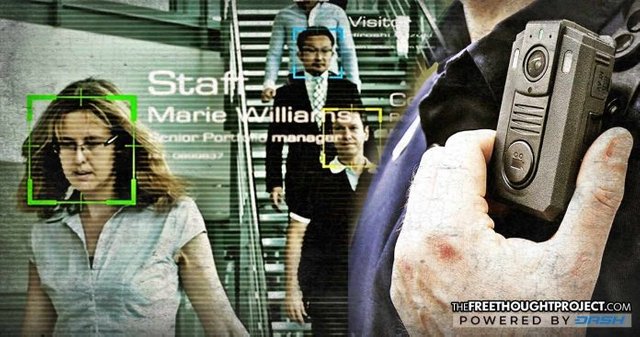Public to Be Scanned in Real Time as Police Body Cameras May Soon Get Facial Recognition
By Jack Burns

New innovations in technology are allowing police officers to contribute to a growing database by implementing facial recognition software in Breathalyzer tests and body cameras.
The largest maker of body cameras in the United States, Axon, announced last week that it has purchased two artificial intelligence companies and it is creating an ethics board for the purpose of preparing to use the technology with its current products. Despite acknowledging the “bias and misuse” that will likely take place with such a system, the company’s founder, Rick Smith argues that the tech’s benefits cannot be ignored.
“I don’t think it’s an optimal solution, the world we’re in today, that catching dangerous people should just be left up to random chance, or expecting police officers to remember who they’re looking for,” he told WaPost. “It would be both naive and counterproductive to say law enforcement shouldn’t have these new technologies.
They’re going to, and I think they’re going to need them. We can’t have police in the 2020s policing with technologies from the 1990s.” Both China and the UK — two major police states — already deploy cameras that use facial recognition in public. In a letter to Axon, 42 groups including the ACLU, NAACP, and the National Urban League pointing out the police state dangers associated with such a program, calling it “categorically unethical to deploy.”
Axon has a responsibility to ensure that its present and future products, including AI-based products, don’t drive unfair or unethical outcomes or amplify racial inequities in policing. Axon acknowledges this responsibility—the company states that it “fully recognize[s] the complexities and sensitivities around technology in law enforcement, and [is] committed to getting it right.” Certain products are categorically unethical to deploy. Chief among these is real-time face recognition analysis of live video captured by body-worn cameras. Axon must not offer or enable this feature. Real-time face recognition would chill the constitutional freedoms of speech and association, especially at political protests….Real-time face recognition could also prime officers to perceive individuals as more dangerous than they really are and to use more force than the situation requires. No policy or safeguard can mitigate these risks sufficiently well for real-time face recognition ever to be marketable.
But Axon is not alone in their police state profiteering, in order for the prison industrial complex to be fed a constant stream of inmates, allowing prison corporations, county jails, and police departments to profit off of arrests, the charging of an impaired driver must be streamlined. One company believes it has solved the problems that exist with subjective field sobriety tests and faulty roadside drug tests. Breathalytics has developed a kiosk that serves three purposes.
It scans a person’s fingerprint, scans their face for biometrics data, and tests their breath for the presence of alcohol, and presumably, drugs. It also records the entire kiosk visit on video.
The company calls the kiosk an example of “effortless alcohol screening” and says its kiosk helps facilitate the “alcohol monitoring industry.”
Yes, that’s right. Monitoring drug rehab attendees, parolees, work/release, and roadside participants is now being called an “industry.”
If for one second you ever wondered what was meant by the term “prison industrial complex,” Breathalytics is a part of that self-professed “industry,” consisting of any business connected to the imprisoning of individuals.
Breathalytics is offering its kiosk to police departments, courts, and jails right now as a free trial. The temptation may be too great for some law enforcement agencies to resist. But what are the ethical implications for a sobriety kiosk? Let’s take a closer look at the issues. Breathalyzer claims to calibrate itself and is near foolproof. However, who makes that determination?
According to Massprivatei, the source code for the kiosk is proprietary and cannot be independently verified. Who makes such a determination? Blood alcohol content (BAC) rates are often subjective and are not very reflective of a person’s impairment, especially near the United States’ legal limit of .08. Some states are not happy that people are allowed to drink alcohol and drive with a .08 BAC.
Many are pushing to have the BAC levels lowered, which could mean that anyone who was caught after drinking one bottle of beer or one glass of wine could be subject to the full ramifications of the law following a DUI arrest. But more disturbing may be the data control implications of a kiosk that records a person’s biometrics, fingerprints, and breath.
The Breathalytics machine can also collect DNA if saliva is produced when blowing through the machine.
Who ultimately collects the data, stores it, and then keeps it from being used for more nefarious purposes, such as cataloging Americans’ DNA? Do Americans have a God-given right to their privacy? Are we allowed to keep our DNA, our fingerprints, and our biometrics to ourselves?
It seems citizens have lost that right. Already, in any international airport in the United States, millions of travelers are having their bodies scanned, supposedly in an effort to sniff for explosives. Remember the time Americans were walking around with explosives in their pockets? No? No wonder! It never happened!
The U.S. government used the 9/11 attacks as an excuse to take away Americans’ rights to travel freely without having their privacy infringed upon, by creating the Transportation Safety Administration and implementing full body scanning of individuals who want nothing more than to travel. Now, it seems, the same type of TSA-style spy devices are making their way to the streets with police officers who are encouraged to adopt a breathalyzer kiosk.
The machines could easily be installed in the roadside travel trailers police use in DUI checkpoints to charge people with oftentimes frivolous DUI charges that ultimately enrich the police department, the prosecutor, and the industries which benefit from random drug testing and the imprisoning of people in its complex. If police departments adopt the alcohol kiosks they will, in essence, allow a private company to possess nearly all identifying information a person possesses. What could possibly go wrong?

We are the Free Thought Project — a hub for Free Thinking conversations about the promotion of liberty and the daunting task of government accountability. All of our content was created by our team of artists and writers. Learn more about us on our website thefreethoughtproject.com.
The majority of dumb humanity volunteering to face identify. To them, a selfie is number 1 priority.
... The more we accept this, the more we are already there
To listen to the audio version of this article click on the play image.

Brought to you by @tts. If you find it useful please consider upvote this reply.
Curated for #informationwar (by @openparadigm)

Relevance: Surveillance
Our Purpose
Sigh....I guess I'm moving into a 4th spatial dimension so they can't find me. Only downside is the place gives my 3d primate brain a headache.
Guilty until proven innocent....?
Outrage, protest, and opposition to this, or any other technology, is both useless and counterproductive.
What is really the problem is that we individual members of the public aren't using this technology to identify everyone we are surrounded and impacted by in our day to day lives.
People need bodycams, facial recognition tech, and a constant stream to a decentralized blockchain archival solution, in order to provide real time, timestamped, evidence of their acts and reactions, and what--and who--they're reacting to.
This technology empowers us far more than it empowers institutions, since institutions have long been able to employ proprietary archival solutions individuals have not. The leap in power available to individuals is far greater than to institutions, who have historically used their resources to verify ID of those they interact with. Consider the benefits to people of being able to verify identity of everyone to this same degree of specificity and as immediately as every global corporation, military force, or policeman, and then avail that information to their peers.
This is not a technology to oppose. It's one we need to embrace as soon as possible for the actual public--not leave only our would be masters to wield it against us. These impositions will very soon become retractions as our power relative to our oppressors is vastly increased by adopting these technologies, and they no longer have monopolies on these powers.
Consider how Fakebook has enabled us to keep in touch with each other. Then consider the difference between how Fakebook and Steemit have treated the information collected. Steemit makes that information publicly available, raising all our power levels to over 9000 and eliminating the power institutions like the NSA, Dyncorp, or Fakebook have over us. We become their equal--as individuals, as well as, and by, being peers.
This power is greater for us, because we are peers, and corporations, despite the dirty 'legal persons' fiction, are not. The fullness of society has ultimate power to control society, and that power has heretofore been restricted by our lack of technology to directly share this and all data with our peers, and coordinate response.
We have lived in a world of lone wolves, where the real wolves are monster packs--corporations. Now we can become the monster pack, and corporations relegated to placid herds of sheep to grace us with our rational employment of social cooperation's benefits.
As they should be, and have always been purposed to be, since their inception. It is informative to consider the earliest corporate charters, and examine the evolution of such implementations to the present day.
We should expect this, and all such technologies, to be blessings, because we get them into the wild asap, where we benefit most from them, both overall, and overwhelmingly.
The police in Uk use alot of technologies..It's only going to get worse..I have bought myself some land to opt out of it all...
How long will it take to go from smart phones to implants??
We are facing a powerful enemy and they want total control. With the general population they aren't far off,,,
Great post..